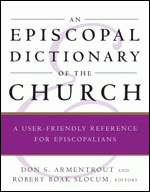These Dreams of You
Last night I needed a change in study position, so I sprawled out across the couch on my stomach with Ehrman's New Testament on my left and my computer on my right. I got part way through the discussion of the comparitive method before I started to notice that Ehrman was sounding a lot like my pastoral theology class I'd just been in a few hours ealier. Really, he was mentioning it was important to know when to refer texts to others, rather than get in over your exegetical head.
Then he moved into historical Christian worship. He explained that in the New Testament, chalices and cruets were divided into different Gospels so that each one could chart the progression of different eucharistic vessels. A Frankish noble showed up (in full armor mind you) to tell me about how the Fourth Lateran Council was harmful to those who were expecting to infuse their Christianity with their baby-eating. Who were they to judge? And by the way, Ehrman pointed out, Anselm had never read the Gospel of Matthew, so he didn't know that the sacrificial atonement thing would have been fine for the non-Isrealite Christians of the 11th century. Everyone can get into the sacrifical atonement, even Karl Barth. And he glared at me! There was an unidentified woman there who warned me not to question the ritual killing of Christians by medieval Jews because Luke and Mark had predicted it in code in their Gospels, and I knew then I was going to have to ask Loius Weil if that was right in our next class. But wait! Where am I doing field education????!!!!
And then I woke up. Really, these seminary classes are trying their damnedest to integrate themselves inside my head, but every so often there is a processing jam, and I end up wondering if Luke's gospel is related to Rahner's Anonymous Christianity, or spending 20 minutes trying to remember what the F pyx are. C'est la seminarie vie.
It makes for great dreams, though.






